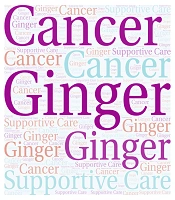Dear Editor,
Ginger (Zingiber officinale) is a flowering plant whose rhizome, ginger root, or ginger, is widely used as a spice and folk medicine. Its unique flavor and medicinal properties are garnering increasing attention in the field of cancer therapy (1). While it is important to emphasize that ginger should not replace conventional cancer treatments, numerous studies suggest that it may possess certain properties that could be beneficial for cancer prevention and supportive care during treatment. Some aspects of ginger's potential role in cancer therapy are mentioned here:
1. Ginger's anti-cancer properties: Ginger contains bioactive compounds such as gingerol, paradol, and shogaol, which have been found to possess anti-cancer properties. These compounds exhibit anti-inflammatory and antioxidant effects and have demonstrated the ability to inhibit the growth and proliferation of cancer cells in laboratory studies (2). Gingerol, in particular, has shown promise against different cancer types, including breast, colon, ovarian, and pancreatic cancers (3).
2. Potential mechanisms of action: Ginger's anti-cancer effects are thought to arise from its ability to modulate several cellular signaling pathways involved in tumor growth and progression. For example, gingerol has been found to inhibit cancer cell proliferation by blocking the cell cycle and inducing cell death through apoptosis (4). Furthermore, ginger has shown anti-angiogenic properties, meaning it can inhibit the formation of new blood vessels that supply tumors with nutrients and oxygen, thereby impeding tumor growth (5).
3. Ginger as a supportive care agent: One of the well-established benefits of ginger in cancer therapy is its potential to alleviate treatment-related side effects, particularly chemotherapy-induced nausea and vomiting. Several clinical trials have demonstrated that ginger supplementation can effectively reduce the severity and frequency of these symptoms, improving cancer patients' quality of life (6, 7). The exact mechanisms behind ginger's anti-emetic effects are not fully understood, but it is believed to involve its ability to modulate neurotransmitter pathways in the brain (8).
4. Enhanced chemotherapy sensitivity: In addition to its anti-nausea effects, ginger may also enhance the efficacy of certain chemotherapy agents. Research suggests that ginger can sensitize cancer cells to the cytotoxic effects of chemotherapy drugs, potentially improving treatment outcomes (9). This could be attributed to ginger's ability to interfere with various cellular processes involved in drug resistance, such as inhibiting drug efflux pumps and enhancing drug uptake into cancer cells (10).
5. Conclusions: While studies on ginger and cancer therapy are still evolving, the available evidence suggests ginger holds promise as a complementary approach. Its bioactive compounds exhibit anti-cancer effects, and it has shown potential for alleviating treatment-related side effects and enhancing chemotherapy efficacy. However, it is crucial to consult with healthcare professionals before incorporating ginger into a cancer treatment plan, as individual factors and potential drug interactions need to be considered.
